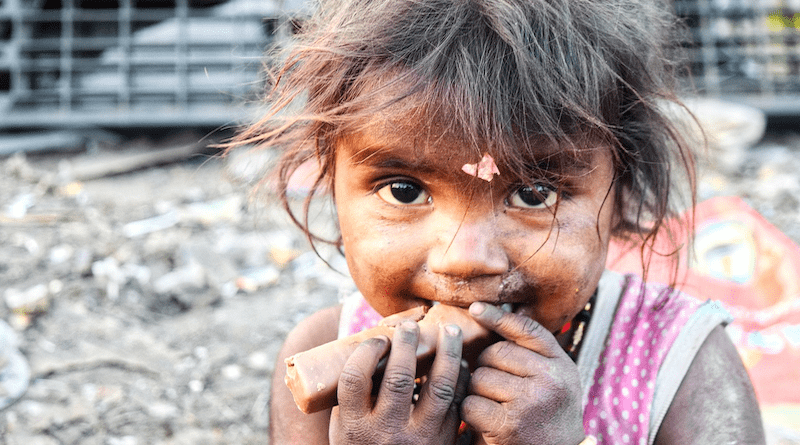Breaking The Chains: International Day For The Eradication Of Poverty – OpEd
The observance of the International Day for the Eradication of Poverty, which is commemorated each year on the 17th of October, endeavors to foster comprehension and discourse between individuals dwelling in impoverished circumstances and the broader society. The prevailing theme for this year draws inspiration from firsthand accounts, illustrating that individuals ensnared in the throes of severe destitution often toil arduously for extended periods under perilous, unregulated circumstances, yet still fail to accrue a sufficient income to adequately provide for themselves and their families.
This year’s thematic emphasis calls for the widespread accessibility of gainful employment and social safeguarding as a means to preserve the intrinsic worth of all human beings. It underscores that gainful employment should not only enable individuals but should also furnish equitable remuneration and secure working environments, fundamentally acknowledging the inherent value and humanity of each laborer. Simultaneously, universal social security assumes a position of paramount urgency in ensuring financial stability for all, with a distinct focus on society’s most fragile members. It is also an earnest entreaty to political leaders and policymakers, beseeching them to enshrine human dignity as the guiding star in every decision-making process, thus ensuring the advancement of essential human liberties and social justice, prioritizing these over the relentless pursuit of corporate gains.
The establishment of robust global alliances among governmental bodies, commercial enterprises, and civil society entities is indispensable for realizing impartial progress and averting any form of exclusion or neglect. Hence, this year’s commemoration represents an opportunity to express unyielding solidarity with those residing in impoverished conditions, genuinely attune to their daily struggles, and rekindle commitments to constructing an equitable economy focused on safeguarding the well-being of both humanity and the environment, transcending the singular quest for pecuniary enrichment. The ultimate aspiration lies in the complete obliteration of destitution, creating the prerequisites for all to subsist with dignity.
In a world characterized by an unparalleled degree of economic progress, technological resources, and financial capital, the existence of millions enduring extreme impoverishment constitutes an ethical abomination. Poverty transcends mere economic quandaries; it is, in fact, a multifaceted phenomenon encompassing not only financial destitution but also the elemental capacities necessary for leading a life of honor.
Individuals subjected to the rigors of poverty grapple with a host of intertwined and mutually reinforcing privations that curtail their realization of fundamental rights and perpetuate their impoverishment, which includes harrowing occupational circumstances, precarious housing conditions, scarcity of nourishing sustenance, disparity in accessing the legal system, insufficient political influence and restricted entry to healthcare facilities
Individuals living in poverty contend with a complex web of interconnected challenges that not only obstruct their exercise of fundamental rights but also perpetuate their impoverished conditions. These challenges encompass daunting occupational circumstances, characterized by low-paying, unstable jobs that offer little job security or opportunities for advancement. Precarious housing conditions, including overcrowded or substandard living conditions, homelessness, and eviction threats, exacerbate their instability. A scarcity of nourishing sustenance contributes to malnutrition and overall health issues. Disparities in accessing the legal system often leave them without adequate representation or justice. Insufficient political influence further marginalizes them, limiting their capacity to advocate for their needs and influence policies that could benefit them. Additionally, restricted entry to healthcare facilities results in untreated illnesses and compromised health.
Countermeasures to address these challenges include job training and skill development, affordable housing initiatives, food assistance programs, legal aid services, community empowerment, and improved healthcare access, which collectively work towards breaking the cycle of poverty and providing individuals with the opportunities they need to improve their quality of life. To address these challenges, several countermeasures can be considered:
Implement programs that provide training and skill development opportunities to help individuals in poverty access better job prospects and improve their earning potential. Develop affordable housing programs to ensure that individuals have access to safe and stable housing, reducing homelessness and housing insecurity. Implement food assistance programs, such as food banks and subsidized meal programs, to ensure that individuals have access to nutritious sustenance, reducing malnutrition and food insecurity. Enhance legal aid services and advocacy programs to help those in poverty access the legal system, protect their rights, and seek justice. Promote community engagement and empowerment initiatives to ensure that people living in poverty have a voice in shaping policies and decisions that affect their lives. Enhance healthcare access through the expansion of affordable healthcare services, clinics, and health education programs, ensuring that individuals receive adequate medical care.

